#fat acceptance
Text
@fatphobiabusters
@fuckyeahfatpositive
💜
24K notes
·
View notes
Note
I saw a comment on your blog that says 'the way you eat does not cause diabetes'...are you able to expand on that or provide a source I could read? I've been told by doctors that my pre-diabetes was due to weight gain because I get more hungry on my anti psychotics and I'd like to fact check what they've told me! Thank you so much!
Pre-diabetes was rejected as a diagnosis by the World Health Organization (although it is used by the US and UK) - the correct term for the condition is impaired glucose tolerance. Approximately 2% of people with "pre-diabetes" go on to develop diabetes per year. You heard that right - TWO PERCENT. Most diabetics actually skip the pre-diabetic phase.
There are currently no treatments for pre-diabetes besides intentional weight loss. (Hmm, that's convenient, right?) There has yet to be evidence that losing weight prevents progression from pre-diabetes to T2DM beyond a year. Interestingly, drug companies are trying to persuade the medical world to start treating patients earlier and earlier. They are using the term “pre-diabetes” to sell their drugs (including Wegovy, a weight-loss drug). Surgeons are using it to sell weight loss surgery. Everyone’s a winner, right? Not patients. Especially fat patients.
Check out these articles:
Prediabetes: The epidemic that never was, and shouldn’t be
The war on ‘prediabetes' could be a boon for pharma—but is it good medicine?
Also - I love what Dr. Asher Larmie @fatdoctorUK has to say about T2DM and insulin resistance, so here's one of their threads I pulled from Twitter:
1️⃣ You can't prevent insulin resistance. It's coded in your DNA. It may be impacted by your environment. Studies have shown it has nothing to do with your BMI.
2️⃣ The term "pre-diabetes" is a PR stunt. The correct term is impaired glucose tolerance (or impaired fasting glucose) which is sometimes referred to as intermittent hyperglycemia. It does not predict T2DM. It is best ignored and tested for every 3-5yrs.
3️⃣ there is no evidence that losing weight prevents diabetes. That's because you can't reverse insulin resistance. You can possibly postpone it by 2yrs? Furthermore there is evidence that those who are fat at the time of diagnosis fair much better than those who are thin.
4️⃣ Weight loss does not reverse diabetes in the VAST majority of people. Those that do reverse it are usually thinner with recent onset T2DM and a low A1c. Only a tiny minority can sustain that over 2yrs. Weight loss does not improve A1c levels beyond 2 yrs either.
5️⃣ Weight loss in T2DM does not improve macrovascular or microvascular health outcomes beyond 2 years. In fact, weight loss in diabetics is associated with increased mortality and morbidity (although it is not clear why). Weight cycling is known to impacts A1c levels.
6️⃣ Weight GAIN does NOT increase the risk of cardiovascular OR all causes mortality in diabetics. In fact, one might even go so far as to say that it's better to be fat and diabetic than to be thin and diabetic.
Dr. Larmie cites 18 peer reviewed journal articles (most from the last decade) that are included in their webinar on the subject, linked below.
#diabetes#t2dm#type 2 diabetes#prediabetes#weight science#weight stigma#fat liberation#fat acceptance#inbox
29K notes
·
View notes
Text
the fact that fat people are made to feel bad about everything down to how loud or hard they are breathing says a lot about this society
#plus size blogger#softestjilly#fat acceptance#fat activism#fat liberation#fat libreration#cw fatphobia
14K notes
·
View notes
Text
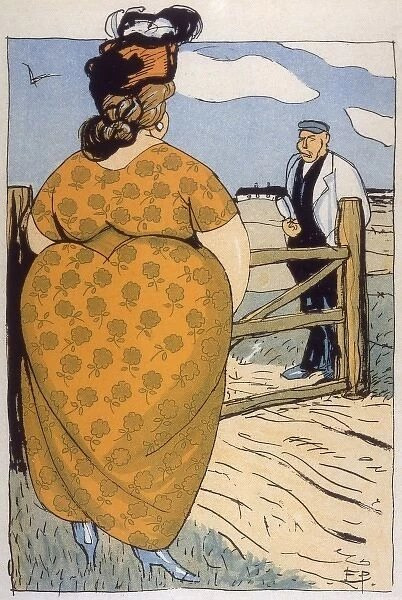
How do we break it to boomers with actual brain damage and nostalgic brainrot, and the 'tradwife' thirsting Andrew Tate fans that bodyfat, average attire, an overall lack of professional haircare or makeup, and non-conventionally attractive women existed and represented the vast majority of women across all of history?







And that, yes, in fact, their belief that "all women were hot skinny super models" in x timeframe is because they keep posting images of fashion models, actresses, idealized pinup art, and creepshots of actual teenage girls instead of middle aged, elderly and ordinary women from whatever era. Man, history sure was an insane person's exact perfect paradise consisting solely of people specifically they were attracted to--when filtered through a cherry picked lens of solely famous glamor girls instead of just women workers, family photos and life events taking place anywhere outside of Hollywood.






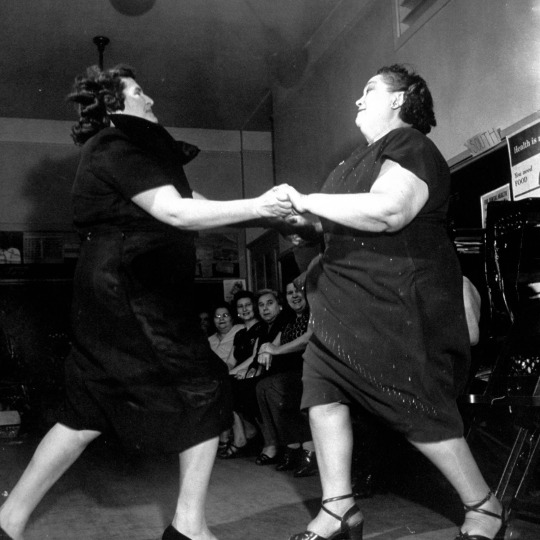

It really does irk me that one day people will assume all of the 21st century consisted of women who looked like whichever three actresses are most remembered one day and a few odd instagram filtered images--because already, a massive wealth of evidence already exists to the contrary for all of prior history and people are still somehow convinced everyone on Earth was a size zero with perfect hair and makeup for all of human history. That's just not how anything works. It's not how women work. It's not how humans work.





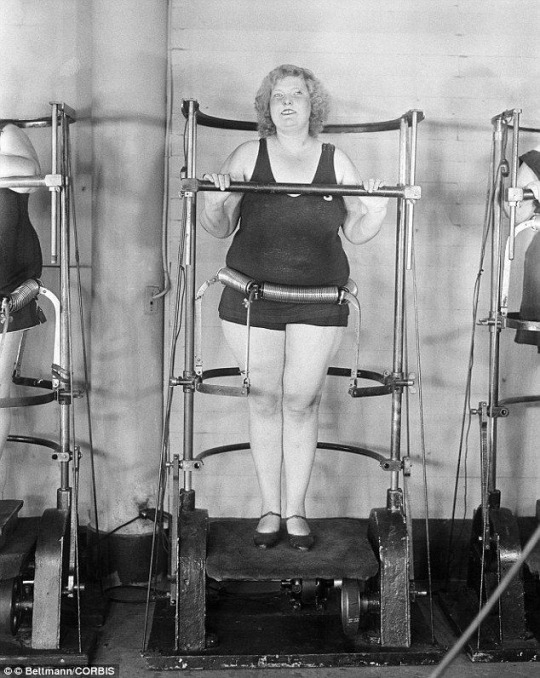





Another fun fact, the majority of surviving articles of clothing from eons ago were extremely petite, extremely glamorous, and unfathomably tiny. You know why? Because they ..weren't worn. This is a well known example of survivors bias in the fashion industry. Expensive gowns and teeny martini dresses were usually only worn once or twice, if not solely worn by manikins in high end stores. Most people kept a consistent and small wardrobe for their entire lives. New clothes were rare, often custom fit or taylored by family at home, or hand-me downs from sibling to sibling. These clothes that were worn to death and destroyed from decades of use were thrown away. They didn't survive to the modern era because they were overly worn, large, and unglamorous.
Think of it this way, you might save your prom dress or your wedding dress but you're not saving the teeshirt with spaghetti stains on it for future generations to see. Why would you? Those are the clothes that don't survive.



4K notes
·
View notes
Text
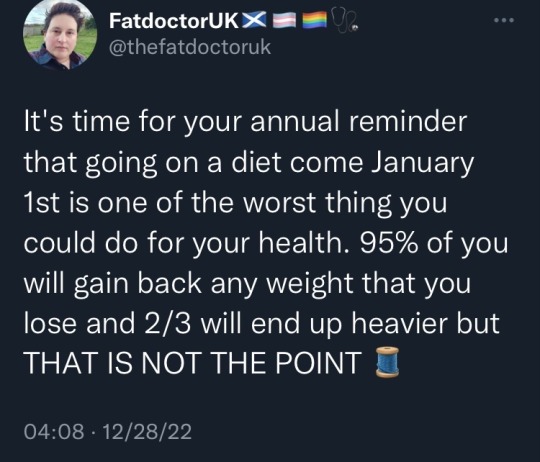

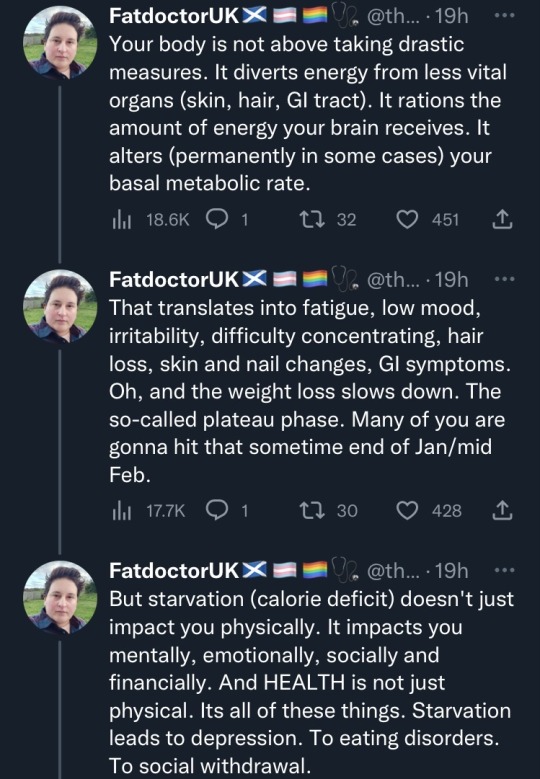

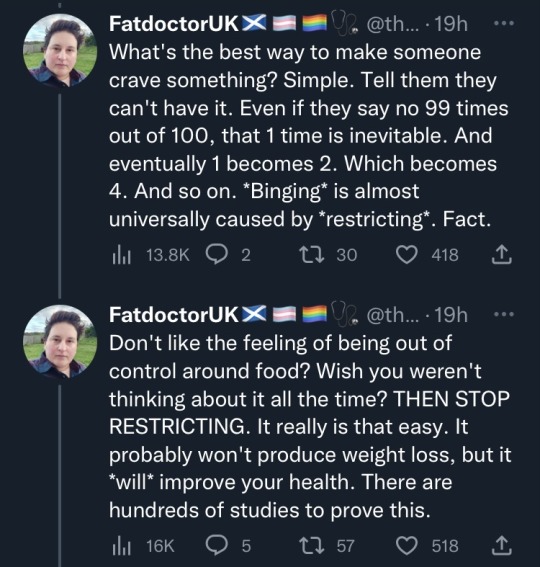

(Source)
20K notes
·
View notes
Text
It's fascinating how fatphobes' brains kind of stop at "people shouldn't be fat" or "fat people should lose weight". Like if it's tough to fit into airplane seats, or find clothes, or get a doctor to take you seriously - their solution is weight loss. As if anything and everything can wait until you've become skinny.
I mean even if we play along and pretend that long-term weight loss IS achievable for everyone and not just a small minority - that takes time? Even the handful of fat people who will be skinny in five years are still fat now, and they'll be fat tomorrow too. They will be here on earth for the duration of those five years, living and partaking in society.
It just baffles me that some people will always be like "I just don't think anyone should be/stay fat" and that's the end of their argument. Like.. ok bro. Fat people are still here though, regardless. I'm gonna keep needing clothes to wear.
15K notes
·
View notes
Text
one of the things I cherish about Dungeon Meshi is how loving and respectful Ryoko Kui is towards her characters with bigger body frames and/or characters who weigh more.
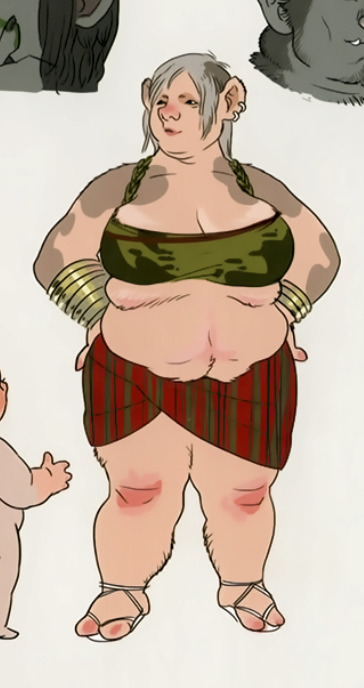



They're presented as beautiful and normal, without ever crossing over into fetishization. It makes me feel so hopeful that representation and acceptance of fat people and fat characters is possible <3
#dungeon meshi#dunmeshi#<33333#ryoko kui#body positivity#body acceptance#fat positvity#fat acceptance#plus size positivity#delicious in dungeon
2K notes
·
View notes
Text


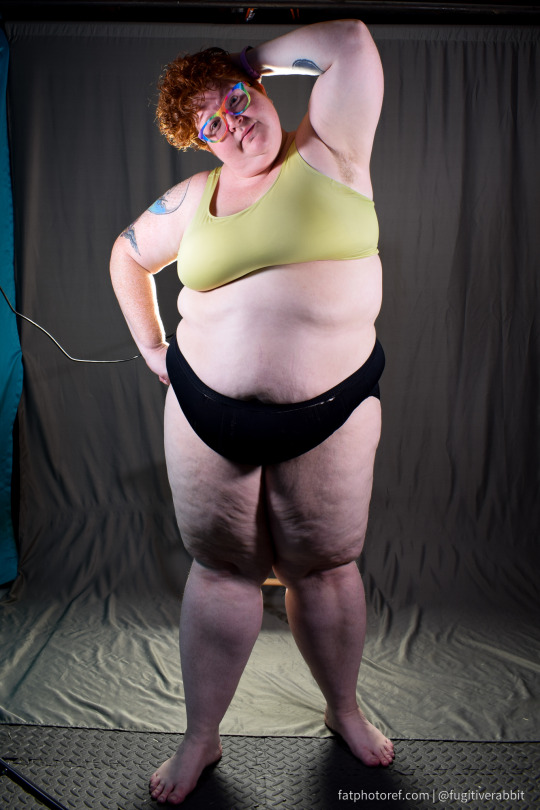






Thanks to some incredible supporters I was able to purchase new lighting for fatphotoref!
That means that there are new photos going up on the site every Monday from now through September. If you don’t want to wait that long to see them all, I’ve added an option to buy the full set from my last shoot on my ko-fi page.
Here’s a direct link to purchase the mega-pack, but no pressure whatsoever. https://ko-fi.com/s/7d8ba786c4

#fat acceptance#fat reference#plus size ref#plus size art#fat art#fat art model#fat artist#artists on tumblr#fat positive#art reference#fat liberation#fat model#refs#art tips#art resources#reference#fatphotoref
6K notes
·
View notes
Text

The rolls on my body are art and I love them 🥰
#personal#me#chubby#body positive#plus size#thick#fat positive#soft tummy#spicy creator#fat girls#fat and fabulous#fat acceptance#fat liberation
2K notes
·
View notes
Photo
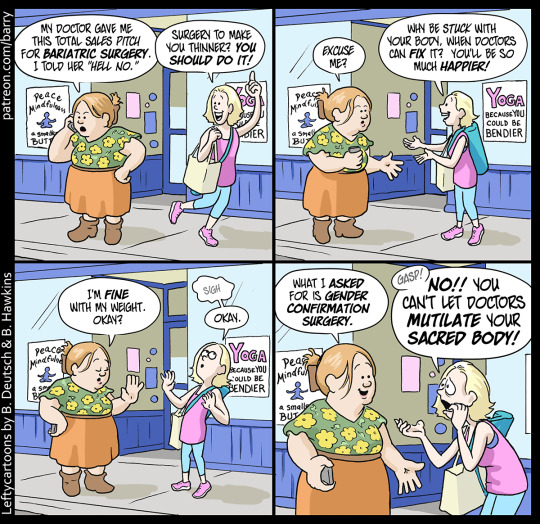
The Knife Cuts Both Ways
A #PoliCartoon by Becky Hawkins and I.
Transcript (and also some commentary and quotes and such): https://www.patreon.com/posts/knife-cuts-both-74955083
If you like these cartoons, please consider supporting them at http://patreon.com/barry - a $1 pledge really helps!
15K notes
·
View notes
Text
yeah you’re a ‘leftist’ but are you normal about fat people hmm?
13K notes
·
View notes
Note
they have a point though. you wouldn't need everyone to accommodate you if you just lost weight, but you're too lazy to stick to a healthy diet and exercise. it's that simple. I'd like to see you back up your claims, but you have no proof. you have got to stop lying to yourselves and face the facts
Must I go through this again? Fine. FINE. You guys are working my nerves today. You want to talk about facing the facts? Let's face the fucking facts.
In 2022, the US market cap of the weight loss industry was $75 billion [1, 3]. In 2021, the global market cap of the weight loss industry was estimated at $224.27 billion [2].
In 2020, the market shrunk by about 25%, but rebounded and then some since then [1, 3] By 2030, the global weight loss industry is expected to be valued at $405.4 billion [2]. If diets really worked, this industry would fall overnight.
1. LaRosa, J. March 10, 2022. "U.S. Weight Loss Market Shrinks by 25% in 2020 with Pandemic, but Rebounds in 2021." Market Research Blog.
2. Staff. February 09, 2023. "[Latest] Global Weight Loss and Weight Management Market Size/Share Worth." Facts and Factors Research.
3. LaRosa, J. March 27, 2023. "U.S. Weight Loss Market Partially Recovers from the Pandemic." Market Research Blog.
Over 50 years of research conclusively demonstrates that virtually everyone who intentionally loses weight by manipulating their eating and exercise habits will regain the weight they lost within 3-5 years. And 75% will actually regain more weight than they lost [4].
4. Mann, T., Tomiyama, A.J., Westling, E., Lew, A.M., Samuels, B., Chatman, J. (2007). "Medicare’s Search For Effective Obesity Treatments: Diets Are Not The Answer." The American Psychologist, 62, 220-233. U.S. National Library of Medicine, Apr. 2007.
The annual odds of a fat person attaining a so-called “normal” weight and maintaining that for 5 years is approximately 1 in 1000 [5].
5. Fildes, A., Charlton, J., Rudisill, C., Littlejohns, P., Prevost, A.T., & Gulliford, M.C. (2015). “Probability of an Obese Person Attaining Normal Body Weight: Cohort Study Using Electronic Health Records.” American Journal of Public Health, July 16, 2015: e1–e6.
Doctors became so desperate that they resorted to amputating parts of the digestive tract (bariatric surgery) in the hopes that it might finally result in long-term weight-loss. Except that doesn’t work either. [6] And it turns out it causes death [7], addiction [8], malnutrition [9], and suicide [7].
6. Magro, Daniéla Oliviera, et al. “Long-Term Weight Regain after Gastric Bypass: A 5-Year Prospective Study - Obesity Surgery.” SpringerLink, 8 Apr. 2008.
7. Omalu, Bennet I, et al. “Death Rates and Causes of Death After Bariatric Surgery for Pennsylvania Residents, 1995 to 2004.” Jama Network, 1 Oct. 2007.
8. King, Wendy C., et al. “Prevalence of Alcohol Use Disorders Before and After Bariatric Surgery.” Jama Network, 20 June 2012.
9. Gletsu-Miller, Nana, and Breanne N. Wright. “Mineral Malnutrition Following Bariatric Surgery.” Advances In Nutrition: An International Review Journal, Sept. 2013.
Evidence suggests that repeatedly losing and gaining weight is linked to cardiovascular disease, stroke, diabetes and altered immune function [10].
10. Tomiyama, A Janet, et al. “Long‐term Effects of Dieting: Is Weight Loss Related to Health?” Social and Personality Psychology Compass, 6 July 2017.
Prescribed weight loss is the leading predictor of eating disorders [11].
11. Patton, GC, et al. “Onset of Adolescent Eating Disorders: Population Based Cohort Study over 3 Years.” BMJ (Clinical Research Ed.), 20 Mar. 1999.
The idea that “obesity” is unhealthy and can cause or exacerbate illnesses is a biased misrepresentation of the scientific literature that is informed more by bigotry than credible science [12].
12. Medvedyuk, Stella, et al. “Ideology, Obesity and the Social Determinants of Health: A Critical Analysis of the Obesity and Health Relationship” Taylor & Francis Online, 7 June 2017.
“Obesity” has no proven causative role in the onset of any chronic condition [13, 14] and its appearance may be a protective response to the onset of numerous chronic conditions generated from currently unknown causes [15, 16, 17, 18].
13. Kahn, BB, and JS Flier. “Obesity and Insulin Resistance.” The Journal of Clinical Investigation, Aug. 2000.
14. Cofield, Stacey S, et al. “Use of Causal Language in Observational Studies of Obesity and Nutrition.” Obesity Facts, 3 Dec. 2010.
15. Lavie, Carl J, et al. “Obesity and Cardiovascular Disease: Risk Factor, Paradox, and Impact of Weight Loss.” Journal of the American College of Cardiology, 26 May 2009.
16. Uretsky, Seth, et al. “Obesity Paradox in Patients with Hypertension and Coronary Artery Disease.” The American Journal of Medicine, Oct. 2007.
17. Mullen, John T, et al. “The Obesity Paradox: Body Mass Index and Outcomes in Patients Undergoing Nonbariatric General Surgery.” Annals of Surgery, July 2005. 18. Tseng, Chin-Hsiao. “Obesity Paradox: Differential Effects on Cancer and Noncancer Mortality in Patients with Type 2 Diabetes Mellitus.” Atherosclerosis, Jan. 2013.
Fatness was associated with only 1/3 the associated deaths that previous research estimated and being “overweight” conferred no increased risk at all, and may even be a protective factor against all-causes mortality relative to lower weight categories [19].
19. Flegal, Katherine M. “The Obesity Wars and the Education of a Researcher: A Personal Account.” Progress in Cardiovascular Diseases, 15 June 2021.
Studies have observed that about 30% of so-called “normal weight” people are “unhealthy” whereas about 50% of so-called “overweight” people are “healthy”. Thus, using the BMI as an indicator of health results in the misclassification of some 75 million people in the United States alone [20].
20. Rey-López, JP, et al. “The Prevalence of Metabolically Healthy Obesity: A Systematic Review and Critical Evaluation of the Definitions Used.” Obesity Reviews : An Official Journal of the International Association for the Study of Obesity, 15 Oct. 2014.
While epidemiologists use BMI to calculate national obesity rates (nearly 35% for adults and 18% for kids), the distinctions can be arbitrary. In 1998, the National Institutes of Health lowered the overweight threshold from 27.8 to 25—branding roughly 29 million Americans as fat overnight—to match international guidelines. But critics noted that those guidelines were drafted in part by the International Obesity Task Force, whose two principal funders were companies making weight loss drugs [21].
21. Butler, Kiera. “Why BMI Is a Big Fat Scam.” Mother Jones, 25 Aug. 2014.
Body size is largely determined by genetics [22].
22. Wardle, J. Carnell, C. Haworth, R. Plomin. “Evidence for a strong genetic influence on childhood adiposity despite the force of the obesogenic environment” American Journal of Clinical Nutrition Vol. 87, No. 2, Pages 398-404, February 2008.
Healthy lifestyle habits are associated with a significant decrease in mortality regardless of baseline body mass index [23].
23. Matheson, Eric M, et al. “Healthy Lifestyle Habits and Mortality in Overweight and Obese Individuals.” Journal of the American Board of Family Medicine : JABFM, U.S. National Library of Medicine, 25 Feb. 2012.
Weight stigma itself is deadly. Research shows that weight-based discrimination increases risk of death by 60% [24].
24. Sutin, Angela R., et al. “Weight Discrimination and Risk of Mortality .” Association for Psychological Science, 25 Sept. 2015.
Fat stigma in the medical establishment [25] and society at large arguably [26] kills more fat people than fat does [27, 28, 29].
25. Puhl, Rebecca, and Kelly D. Bronwell. “Bias, Discrimination, and Obesity.” Obesity Research, 6 Sept. 2012.
26. Engber, Daniel. “Glutton Intolerance: What If a War on Obesity Only Makes the Problem Worse?” Slate, 5 Oct. 2009.
27. Teachman, B. A., Gapinski, K. D., Brownell, K. D., Rawlins, M., & Jeyaram, S. (2003). Demonstrations of implicit anti-fat bias: The impact of providing causal information and evoking empathy. Health Psychology, 22(1), 68–78.
28. Chastain, Ragen. “So My Doctor Tried to Kill Me.” Dances With Fat, 15 Dec. 2009. 29. Sutin, Angelina R, Yannick Stephan, and Antonio Terraciano. “Weight Discrimination and Risk of Mortality.” Psychological Science, 26 Nov. 2015.
There's my "proof." Where is yours?
#inbox#fat liberation#fat acceptance#fat activism#anti fatness#anti fat bias#anti diet#resources#facts#weight science#save
8K notes
·
View notes
Text
Fat bodies are mentioned most often in terms of the negative space left behind by the pounds lost, the dress sizes dropped, the inches shrunk—fat bodies are only valued for their absence.
There's a phrase you may have heard, that 'inside every fat person, there's a thin person waiting to get out'. It makes fat bodies sound like a prison, like the grotesque carapace of Kafka's beetle, with the real self like a trapped and frightened Gregor Samsa inside. Society is deeply permeated with the idea that my fat body isn't my 'real' body, and that I need to dig and excavate and starve out my true self, rescuing my inner thin princess from the imprisoning tower of my body.
This idea taught me not to feel fully connected to my body—after all, so much of my body is dead weight, it's not really me, my fatness isn't who I am, so why bother fully inhabiting it?
For years I didn't embrace my body. I was like someone squatting in a few rooms of a mansion, pretending that I was living in a condo and ignoring the three wings, twenty-four bedrooms, ballroom, bowling alley, and the entire library from Disney's Beauty and the Beast that make up my body.
—‘Where Are the Fat Girls? The Absence of Plus-Size Characters in Fantasy Literature’ by Charis M. Ellison [video]
972 notes
·
View notes
Text




PlusLoveDesigns
Feminist, body positive, fat positive art by @ruthsdesigns
#fat positive#body positive#mermaid#plus size#plus size mermaid#black women#mixed race women#siren#semi nude#fat#beauty#fat acceptance#body neutrality#black beauty#black woman#dark skin
5K notes
·
View notes
Text
General Mills and cheaply bought "dietitians" co-opted the anti-diet movement

I'm on tour with my new, nationally bestselling novel The Bezzle! Catch me in NEXT THURSDAY (Apr 11) in BOSTON with Randall "XKCD" Munroehttps://cockeyed.com/lessons/viagra/viagra.html, then PROVIDENCE, RI (Apr 12), and beyond!

Steve Bannon isn't wrong: for his brand of nihilistic politics to win, all he has to do is "flood the zone with shit," demoralizing people to the point where they no longer even try to learn the truth.
This is really just a more refined, more potent version of the tactical doubt sown by Big Tobacco about whether smoking caused cancer, a playbook later adopted by the fossil fuel industry to sell climate denial. You know Darrell Huff's 1954 classic How To Lie With Statistics? Huff was a Big Tobacco shill (his next book, which wasn't ever published, was How To Lie With Cancer Statistics). His mission wasn't to help you spot statistical malpractice – an actual thing that is an actual problem that you should actually learn to spot. It was to turn you into a nihilist who didn't believe anything could be known:
https://pluralistic.net/2021/01/04/how-to-truth/#harford
Corporations don't need you to believe that their products are beneficial or even non-harmful. They just need you to believe nothing. If you don't know what's true, then why not just do whatever feels good, man? #YOLO!
These bannonfloods of shit are a favored tactic of strongmen and dictators. Their grip on power doesn't depend on their citizens trusting them – it's enough that they trust no one:
http://jonathanstray.com/networked-propaganda-and-counter-propaganda
Bannonflooding is especially beloved of the food industry. Food is essential, monopolized, and incredibly complicated, and many of the most profitable strategies for growing, processing and preparing food are very bad for the people who eat that food. Rather than sacrificing profits, the food industry floods the zone with shit, making it impossible to know what's true, in hopes that we will just eat whatever they're serving:
https://journals.plos.org/plosbiology/article?id=10.1371/journal.pbio.2003460
Now, the "nothing can be known" gambit only works if it's really hard to get at the truth. So it helps that nutrition and diet are very complex subjects, but it helps even more that the nutrition and diet industry are a cesspool of quacks and junk science. This is a "scientific discipline" whose prestigious annual meetings are sponsored (and catered) by McDonald's:
https://www.motherjones.com/environment/2014/05/my-trip-mcdonalds-sponsored-nutritionist-convention/
It's a "science" whose most prominent pitchmen peddle quack nostrums and sue the critics who point out (correctly) that eating foods high in chlorophyll will not "oxygenate your blood" (hint, chlorophyll only makes oxygen in the presence of light, which is notably lacking in your colon):
https://www.badscience.net/2007/02/ms-gillian-mckeith-banned-from-calling-herself-a-doctor/
When the quack-heavy world of nutrition combines with the socially stigmatized world of weight-loss, you get a zone ripe for shitflooding. The majority of Americans are "overweight" (according to a definition that relies on the unscientific idea of BMI) and nearly half of Americans are "obese." These numbers have been climbing steadily since the 1970s, and every diet turns out to be basically bullshit:
https://headgum.com/factually-with-adam-conover/what-does-ozepmic-actually-do-with-dr-dhruv-khullar
Notwithstanding the new blockbuster post-Ozempic drugs, we're been through an unbroken 50-year run of more and more of us being fatter and fatter, even as fat stigma increased. Fat people are treated as weak-willed and fundamentally unhealthy, while the most prominent health-risks of being fat are roundly neglected: the mental health effects of being shamed, and the physical risks of having doctors ignore your health complaints, no matter how serious they sound, and blame them on your weight:
https://maintenancephase.buzzsprout.com/1411126/11968083-glorifying-obesity-and-other-myths-about-fat-people
Fat people and their allies have banded together to address these real, urgent harms. The "body acceptance" movement isn't merely about feeling good in your own skin: it's also about fighting discrimination, demanding medical care (beyond "lose some weight") and warning people away from getting on the diet treadmill, which can lead to dangerous eating disorders and permanent weight gain:
https://www.beacon.org/You-Just-Need-to-Lose-Weight-P1853.aspx
Fat stigma is real. The mental health risks of fat-shaming are real. Eating disorders are real. Discrimination against fat people is real. The fact that these things are real doesn't mean that the food industry can't flood the zone with shit, though. On the contrary: the urgency of these issues, combined with the poor regulation of dietitians, makes the "what should you eat" zone perfect for flooding with endless quantities of highly profitable shit.
Perhaps you've gotten some of this shit on you. Have you found yourself watching a video from a dietitian influencer like Cara Harbstreet, Colleen Christensen or Lauren Smith, promoting "health at any size" with hashtags like #DerailTheShame and #AntiDiet? These were paid campaigns sponsored by General Mills, Pepsi, and other multinational, multibillion-dollar corporations.
Writing for The Examination, Sasha Chavkin, Anjali Tsui, Caitlin Gilbert and Anahad O'Connor describe the way that some of the world's largest and most profitable corporations have hijacked a movement where fat people and their allies fight stigma and shame and used it to peddle the lie that their heavily processed, high-calorie food is good for you:
https://www.theexamination.org/articles/as-obesity-rises-big-food-and-dietitians-push-anti-diet-advice
It's a surreal tale. They describe a speech by Amy Cohn, General Mills’ senior manager for nutrition, to an audience at a dietitian's conference, where Cohn "denounced the media for 'pointing the finger at processed foods' and making consumers feel ashamed of their choices." This is some next-level nihilism: rather than railing against the harmful stigma against fat people, Cohn wants us to fight the stigma against Cocoa Puffs.
This message isn't confined to industry conferences. Dietitians with large Tiktok followings like Cara Harbstreet then carry the message out to the public. In Harbstreet's video promoting Cinnamon Toast Crunch, Cocoa Puffs and Trix, she says, "I will always advocate for fearlessly nourishing meals, including cereal…Because everyone deserves to enjoy food without judgment, especially kids":
https://www.tiktok.com/@streetsmart.rd/video/7298403730989436206
Dietitians, nutritionists and the food industry have always had an uncomfortably close relationship, but the industry's shitflooding kicked into high gear when the FDA proposed rules limiting which foods the industry can promote as "healthy." General Mills, Kelloggs and Post have threatened a First Amendment suit against such a regulation, arguing that they have a free speech right to describe manifestly unhealthy food as "healthy."
The anti-diet movement – again, a legitimate movement aimed at fighting the dangerous junk science behind dieting – has been co-opted by the food industry, who are paying dietitian influencers to say things like "all foods have value" while brandishing packages of Twix and Reese's. In their Examination article, the authors profile people who struggled with their weight, then, after encountering the food industry's paid disinformation, believed that "healthy at any size" meant that it would be unhealthy to avoid highly processed, high calorie food. These people gained large amounts of weight, and found their lives constrained and their health severely compromised.
I've been overweight all my life. I went to my first Weight Watchers meeting when I was 12. I come from a family of overweight people with the chronic illnesses often associated with being fat. This is a subject that's always on my mind. I even wrote a whole novel about the promise and peril of a weight-loss miracle:
https://us.macmillan.com/books/9781429969284/makers
I think the anti-diet movement, and its associated ideas like body acceptance and healthy at every size, are enormously positive developments and hugely important. It's because I value these ideas that I'm so disgusted with Big Food and its cynical decision to flood the zone with shit. It's also why I'm so furious with dietitians and nutritionists for failing to self-regulate and become a real profession, the kind that censures and denounces quacks and shills.
I have complicated feelings about Ozempic and its successors, but even if these prove to be effective and safe in the long term, and even if we rein in the rapacious pharma companies so that they no longer sell a $5 product for $1000, I would still want dietary science to clean up its act:
https://jamanetwork.com/journals/jamanetworkopen/fullarticle/2816824
I'm not a nihilist. I think we can use science to discover truths – about ourselves and our world. I want to know those truths, and I think they can be known. The only people who benefit from convincing you that the truth is unknowable are the people who want to lie to you.

If you'd like an essay-formatted version of this post to read or share, here's a link to it on pluralistic.net, my surveillance-free, ad-free, tracker-free blog:
https://pluralistic.net/2024/04/05/corrupt-for-cocoa-puffs/#flood-the-zone-with-shit
#pluralistic#corruption#nutrition#food#diets#dieticians#nutritionists#junk science#junk food#astroturf#fat acceptance#fatphobia#health#nihilism#steve bannon#flood the zone with shit#general mills#dietitians
897 notes
·
View notes
Text










Realistic representation is important to me so I strive to illustrate a variety of body-types. Here are a few from my recent commissions.
#thatchickmaya#maya lee#body diversity#body positive art#body acceptance#body positive#plus size art#plus size friendly#fat babe#fat art#fat acceptance#fat positive#artists on tumblr
4K notes
·
View notes